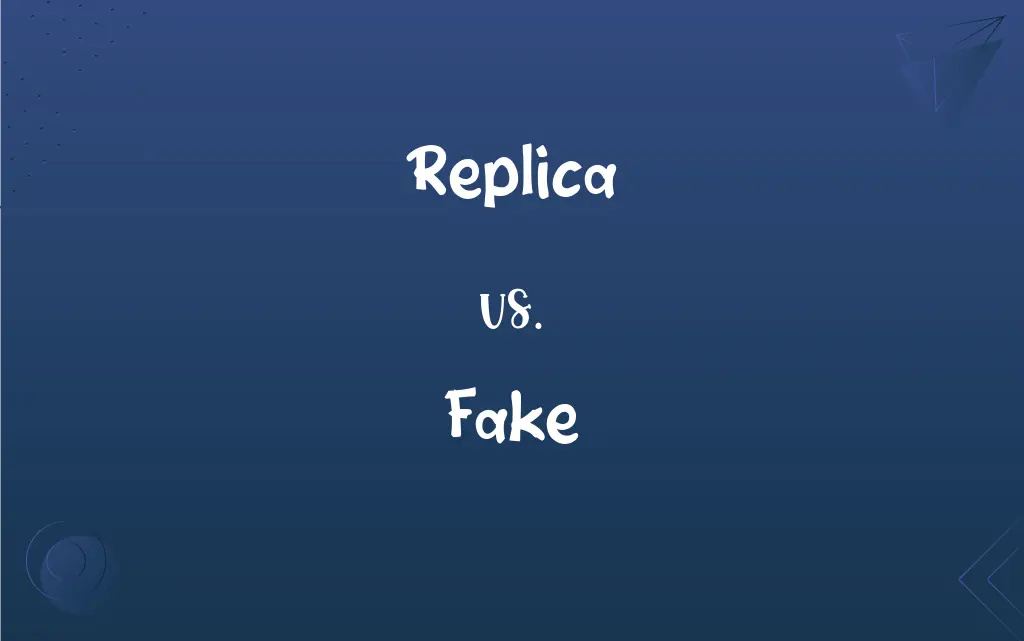Replica vs. Fake: What's the Difference?
Edited by Aimie Carlson || By Harlon Moss || Updated on October 24, 2023
A replica is an intentional and honest copy of an original, while a fake is a deceitful imitation presented as genuine.

Key Differences
A replica and a fake, while both imitations, serve different purposes and convey distinct implications. A replica is created as an acknowledged and often precise copy of an original item. It is not intended to deceive but to replicate the original's essence. Conversely, a fake is produced with the intent of misleading by making it appear as the genuine article, often for fraudulent gains.
The production of a replica often stems from admiration or the need for a substitute when the original is inaccessible. For instance, museums often display replicas of artifacts to preserve the originals or when they're too fragile. Fakes, however, are crafted to deceive and mislead buyers or observers, making them believe they're purchasing or viewing the original.
The value associated with a replica and a fake also differs significantly. Replicas, being honest reproductions, might still hold value, especially if crafted with skill and precision. Fakes, due to their deceptive nature, are usually considered to have less or even no value, particularly when their true nature is discovered.
Authenticity is another defining difference. When purchasing a replica, one does so with the knowledge that it's a reproduction. The purchase is transparent. When dealing with fakes, there's an element of betrayal, as the buyer believes they are obtaining an original, only to discover it's a counterfeit.
Comparison Chart
Intent
Honest reproduction
Deceptive imitation
ADVERTISEMENT
Purpose
Replicate original's essence without deception
Mislead and present as genuine
Value
Can hold value if well-crafted
Typically loses value upon discovery of its true nature
Transparency in Sale
Sold as a known copy
Sold as the genuine article
Perception
Often accepted and admired for craftsmanship
Generally frowned upon due to deceitful nature
Replica and Fake Definitions
Replica
A reproduction of a work of art.
She bought a replica of Van Gogh's Starry Night for her living room.
ADVERTISEMENT
Fake
An imitation intended to deceive.
She realized her designer bag was a fake after inspecting the stitching.
Replica
A duplicate of an item, often used for display.
The car museum showcased a replica of the first Ford Model T.
Fake
Something made to resemble another thing.
He wore a fake mustache to the costume party.
Replica
A thing made to closely resemble another.
He wore a replica jersey of his favorite soccer player.
Fake
A fraudulent replication of something authentic.
The jeweler identified the gem as a fake diamond
Replica
An exact copy or model of something.
The museum displayed a replica of the original painting.
Fake
A person who appears or claims to be something they're not.
He was exposed as a fake psychic.
Replica
An imitation designed to honor or preserve the original.
The town built a replica of the old fort for historical tours.
Fake
A thing that is not genuine; a forgery or sham.
The art expert confirmed that the painting was a fake.
Replica
A copy or reproduction of a work of art, especially one made by the original artist.
Fake
Having a false or misleading appearance; fraudulent.
FAQs
Can replicas have value?
Yes, replicas can hold value, especially if well-crafted and detailed.
What is a replica?
A replica is an intentional and acknowledged copy of an original item.
Can fakes become valuable over time?
While rare, some fakes, especially those with historical or artistic significance, might gain value over time.
Do museums display replicas or fakes?
Museums typically display replicas to preserve originals or when originals are inaccessible. Fakes are not intentionally displayed.
Do replicas always acknowledge they are reproductions?
Yes, replicas are typically sold with the acknowledgment that they are reproductions.
Is it always easy to distinguish a replica from a fake?
Not always. While replicas are honest reproductions, some fakes are crafted with high precision, making differentiation challenging.
Why are some replicas expensive?
The price of a replica can reflect its craftsmanship, materials used, and the effort to capture the original's details.
Can a replica be an exact duplicate of the original?
Yes, some replicas aim to be exact duplicates, capturing every detail of the original.
Why are fakes frowned upon?
Fakes are deceptive, leading buyers to believe they're obtaining genuine items, which can result in betrayal and financial loss.
How does a fake differ from a replica?
A fake is a deceitful imitation intended to mislead, whereas a replica is an honest reproduction.
Is it illegal to sell fakes?
Selling fakes, especially as genuine items, is often illegal due to counterfeiting and fraud laws.
Is owning a fake illegal?
Owning a fake isn't typically illegal, but producing, selling, or representing them as genuine can be.
Are all replicas considered fakes?
No, replicas are honest reproductions, while fakes are deceptive imitations.
Are replica watches legal?
Selling replica watches as genuine is illegal. However, openly selling them as replicas varies by jurisdiction.
Why would someone buy a replica instead of the original?
Replicas can be more affordable, available, or serve to honor or preserve the original.
Is it ethical to buy a replica?
Buying a replica is generally ethical if it's purchased with the understanding that it's a reproduction and not used deceitfully.
Are there markets known for selling fakes?
Yes, some markets, especially in tourist areas, are infamous for selling fakes, particularly branded goods.
Is there a positive side to fakes?
While fakes are generally viewed negatively due to deception, some argue they make luxury items accessible to more people, albeit without genuine value or authenticity.
Can a fake deceive experts?
Some fakes are so well-crafted that even experts can be deceived initially.
Can a replica be considered art?
Yes, especially when crafted with skill and artistry, a replica can be appreciated as a form of art.
About Author
Written by
Harlon MossHarlon is a seasoned quality moderator and accomplished content writer for Difference Wiki. An alumnus of the prestigious University of California, he earned his degree in Computer Science. Leveraging his academic background, Harlon brings a meticulous and informed perspective to his work, ensuring content accuracy and excellence.
Edited by
Aimie CarlsonAimie Carlson, holding a master's degree in English literature, is a fervent English language enthusiast. She lends her writing talents to Difference Wiki, a prominent website that specializes in comparisons, offering readers insightful analyses that both captivate and inform.
































































